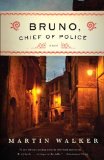Summary | Excerpt | Reviews | Beyond the Book | Readalikes | Genres & Themes | Author Bio

Across the small stream that flowed into the main river, the caves in the limestone cliffs drew his eye. Dark but strangely inviting, the caves with their ancient engravings and paintings drew scholars and tourists to this valley. The tourist office called it the Cradle of Mankind. It was, they said, the part of Europe that could claim the longest period of continuous human habitation. For forty thousand years, through ice ages and warming periods, floods and wars and famine, people had lived here. Bruno, who reminded himself that there were still many caves and paintings that he really ought to visit, felt deep in his heart that he understood why those people had chosen to remain in this gentle valley.
Down at the riverbank, he saw that the rider known to the town as the mad Englishwoman was watering her horse after her morning ride. In the town of St. Denis, everyone had a nickname, and since she was devoted to her horses and invariably carried treats to give to other people’s dogs she evidently conformed to the English stereotype of bizarre affection for animals, even those that did not hunt. Along with her love of privacy and her odd habit of filling in the Times crossword as she walked from the Maison de la Presse to collect her morning croissant from Fauquet’s café, this justified her title. As always, she was correctly dressed in gleaming black boots, cream jodhpurs and a black jacket, and her auburn hair flared out behind her neat black riding hat like the tail of a fox. Of course, she was anything but mad. Moreover, she appeared to make a good business of running her small guesthouse. She even spoke comprehensible French, which was more than could be said of most of the English who had settled here. Bruno looked further up the road that ran alongside the river and saw several trucks bringing local farmers to the weekly market. It would soon be time for him to go on duty. He took out the one item of equipment that never left his side, his cell phone, and called the familiar number of the Hôtel de la Gare.
“Any sign of them, Marie?” he asked. “They hit the market at St. Alvère yesterday, so they are in the region.”
“Not as of last night, Bruno. Just the usual guys from the museum project stayed here and a Spanish truck driver,” replied Marie, who ran the small hotel by the station. “But remember, after they were here last time and found nothing, I heard them talking about staying in Périgueux and renting a car there to put you off the scent.”
Bruno, whose loyalty was to his local community and its mayor rather than to the nominal laws of France, particularly when they were really laws the European Union made in Brussels, played a constant cat-and-mouse game with the inspectors who were charged with enforcing E.U. hygiene rules on the markets of France. Hygiene was all very well, but the locals of St. Denis had been making their cheeses and their pâté de foie gras and their rillettes de porc for centuries before the E.U. even existed, and did not take kindly to foreign bureaucrats telling them what they could and could not sell. Along with other members of the Police Municipale in the region, Bruno had established a rigorous early-warning system to alert the market vendors of their visits.
The inspectors, called “the Gestapo” by some locals in a part of France that had taken very seriously its patriotic duties to resist the German occupation, had made their first visit to the markets of Périgord in an official car with red-and-white Belgian license plates. On their second visit all the tires had been slashed. Next time they came in a car from Paris, with the telltale “75” as the last two digits of the plate. This car, too, had been given the Resistance treatment, and Bruno worried that the local countermeasures were getting out of hand. He had a good idea who was behind the slashings, and had issued some private warnings that he hoped would calm things down. There was no point in violence if the warning system could ensure that the markets were clean before the inspectors arrived.
Excerpted from Bruno, Chief of Police by Martin Walker Copyright © 2009 by Martin Walker. Excerpted by permission of Knopf, a division of Random House, Inc. All rights reserved. No part of this excerpt may be reproduced or reprinted without permission in writing from the publisher.
Any activity becomes creative when the doer cares about doing it right, or better.
Click Here to find out who said this, as well as discovering other famous literary quotes!
Your guide toexceptional books
BookBrowse seeks out and recommends the best in contemporary fiction and nonfiction—books that not only engage and entertain but also deepen our understanding of ourselves and the world around us.